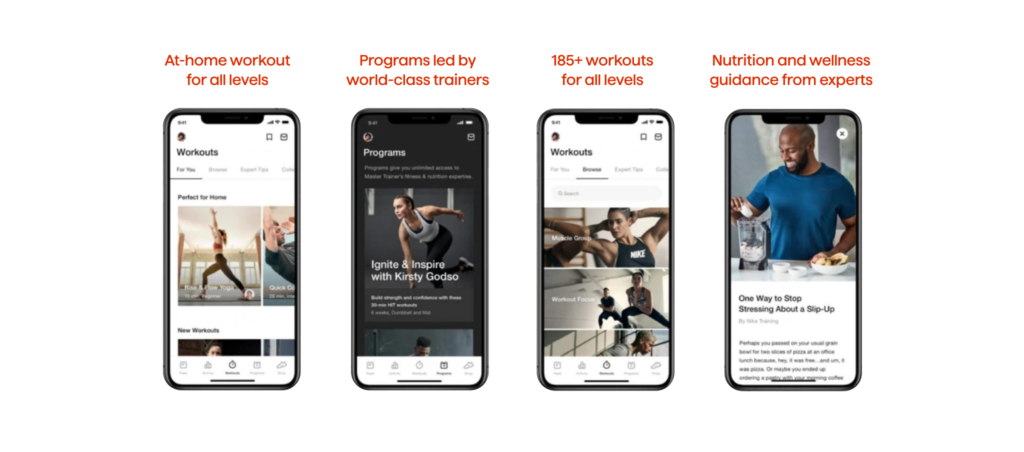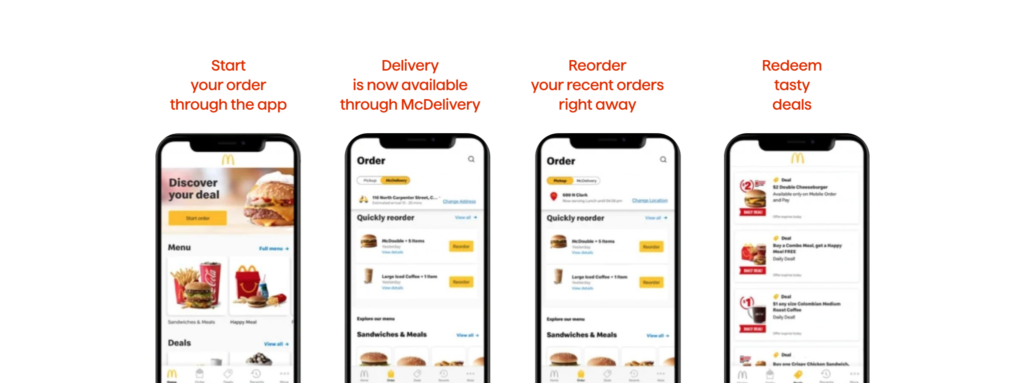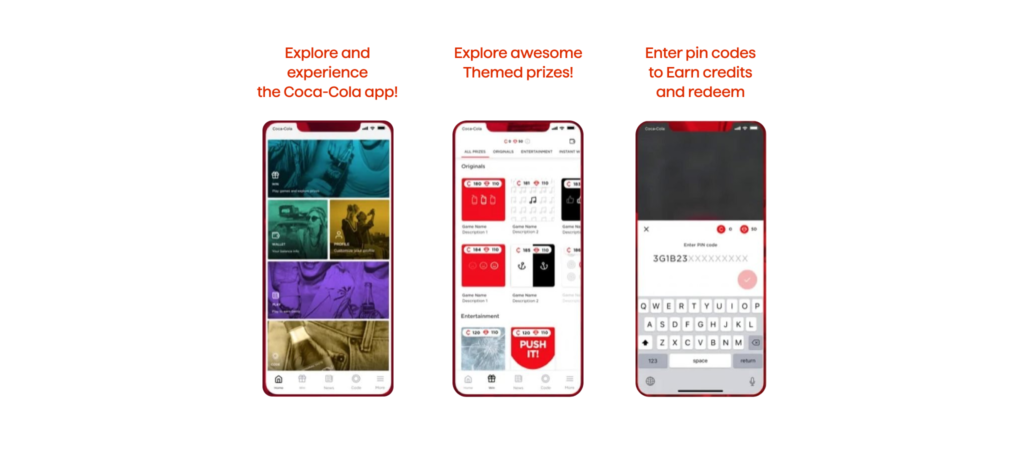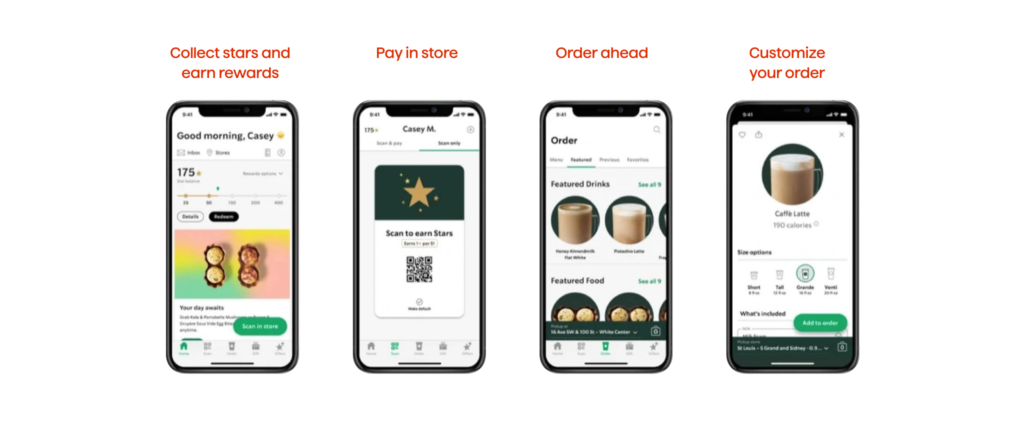5 Brands That Have Notched Up Their Success with Mobile Apps

May 6, 2025 14 min read
Unlock the potential of business mobile apps while learning from top brands.
Mobile apps offer numerous opportunities for businesses of different shapes and sizes, from startups to enterprises. However, creating and launching a branded mobile app to boost your sales and customer relations is not enough. So, what are the magic secrets of incredibly successful competition with more than 1.76 million other apps on the App Store and 2.67 million apps Google Play Store? In today’s article, we will look at famous brands’ top mobile applications and success stories and discuss why your business needs a mobile app.
What Successful Mobile Apps for Business Should Entail
Look at mobility as a new landscape of communication with customers. Like user experience, it is about the user, not your ambitions or personal goals. Make it exciting and sincere.
An app should be the brand’s natural extension. With a clear correlation between your app and your company, the idea behind your app will first satisfy your marketing and PR goals.
Help users and solve their problems. Find an idea to implement in a mobile app to solve your client’s business problems. But let them solve their issues intuitively and effortlessly.
Monitor to discover how your customers use their mobiles and integrate your apps into these habits, simplifying people’s lives. This provides insight into which features they use most frequently, when and where they access the app, and what actions they take within the app. With this information, businesses can tailor their apps to better align with these habits, enhancing usability and overall customer experience.
Surprise and delight. Except for the pragmatic functionality, there always should be a place for an emotional component in a successful dedicated app – an unexpected gift, discount, free service, or shared valuable and interactive story – to make up your success recipe.
5 Mobile Apps for Business Examples That Brought Success to Well-Known Brands
Creating and running multiple small businesses or launching branded apps is not enough. Even though the opportunities seem endless, many entrepreneurs have been out of luck running multiple businesses. The most successful ones share some standard features.
Nike
Nike is a well-known sportswear brand that has extended its reach by offering its clients a complete health and fitness experience. Firstly, in 2006, Nike created a membership program to increase the number customer loyalty of loyal customers. Then, Nike launched their fitness app, which is free for everyone. The app offers guided workouts and helps as sales tools drive the purchases of Nike’s merchandise.
And lastly, recently, Nike launched the Nike App. The platform grants members personalized access to the brand’s products in Southeast Asia and India. There are a lot of benefits that members can get from the Nike App, for example, exclusive access to the latest product releases.
Results: Nike is doing more than great right now. According to the report, the company’s revenue jumped 96% from the lockdown-impacted quarter a year ago to $12.3 billion, up 21% from the fourth quarter of 2019. This shows that the company had a considerable rise ahead of pre-pandemic levels. Moreover, Nike’s direct and digital performance drove direct sales up 73% to $4.5 billion, a third of total revenue.

Ikea
Ikea Place is an app where customers can take a picture of a place in their house and virtually ‘install’ Ikea furniture to see how it goes with the room. That generates interest and lets customers follow the product when they visit the store. After selecting a piece of furniture by scanning a page of a printed catalog, users were asked to put the catalog on the floor, where it acted as an anchor for the 3D image of a piece of furniture.
Results: The app has improved its loyal customer base and streamlined customers’ multiple businesses’ decision-making and purchasing processes. Company reports suggest it was downloaded nearly 8.5 million times.

McDonald’s
McDonald’s leveraged a mobile app and Instagram, one of the world’s most popular photo and video sharing apps, to interact with customers in a new way and advertise their products that needed to be addressed. In March 2013, the company ran a promotion encouraging customers to take pictures of their favorite meals using the mobile application.
Moreover, McDonald’s launched a free plan on their app where customers can have a free plan to access its menu and obtain exclusive vouchers to encourage them to make an order.
Results: McDonald’s also ran its sixth iAd campaign, promoting the company’s products and taking advantage of the device’s capabilities to offer a more interactive experience. Broadening McDonald’s Instagram presence was a success because it brought fresh attention to older products. It also bolstered a ton of user-generated content, which tends to be more influential on customers.

Coca-Cola
Another famous brand that chose to create a mobile app for their business is Coca-Cola. By applying modern technologies like Artificial Intelligence (AI) and Machine Learning (ML), Coca-Cola analyzes data to understand consumer behavior from their buying patterns and how they respond to offers and campaigns.
Coca-Cola began its digital transformation in 2018 to understand its customers and satisfy their needs. The launch of a mobile app was part of their digital transformation campaign. Customers can now redeem loyalty points and discounts on their drinks. Also, in some countries, customers can use one app to buy branded soft drinks from vending machines.
Results: Coca-Cola is another company from our list that grew and made a higher profit than during the pre-pandemic period. More specifically, the company’s second-quarter revenue surpassed 2019 levels of $10.13 billion vs. $9.32 billion expected.

Starbucks
Starbucks’s business application, launched as a business version and a free version as early as 2009, allowed users to locate nearby coffee shops, learn about sorts, types, and coffee brews, and suggest their drinks. Two years later, Starbucks increased its digital presence by bringing its loyalty program to users’ smartphones with the Card Mobile App.
Now, the Starbucks app offers customers a wide range of services and functionality. They can order ahead for pickup or scan and pay in-store. The loyalty system is also a part of this mobile app – customers earn Stars (rewards) they can exchange for free food or drinks. Moreover, it offers valuable functionalities like typing your barista or finding out what songs are playing at your local store.
Results: In the innovative and rational approach to the mobile strategy, in 2013, Starbucks already possessed $621 million in assets on its mobile platforms. In 2014, Starbucks made $146 million, 8 % of total revenue, on interest alone. Now, Starbucks gets more than $34 billion in revenue, an 8.52% increase year-over-year. In addition, transaction costs were reduced significantly since third-party credit card companies no longer needed to be involved.

5 Reasons Why Your Business Needs a Desktop and Mobile App Right Now
Some small business owners believe that mobile app development, implementation, and marketing are luxuries only corporations can afford. Mobile apps are the easiest way to create the next big thing. According to other versions, mobile apps are the best option for a startup to gain momentum. Well, as it is known, the truth is out there, so let’s find out why your small business owner needs a mobile app.
Mobile App Development: Why Should You Consider It?
Today we have no doubts about the popularity of mobile phones and apps developed for mobile platforms. We can think of many charts and expressions proving that mobile is everything but remember the feeling of leaving your smartphone at home. Feeling quite helpless, aren’t you? I can tell you more, and users have no intention to give an app to either their mobile phones or their convenience that is tightly connected with the user needs mobile app address.
Speaking about user needs, mobile app developers should address them. Remember that any business, be it a startup or a big corporation, should exist to serve users. So, the user should be at the heart of the best small business apps and app ideas. It is an idea as a response to the user’s need that will be one of the significant success factors. Though very often, small business owners go too far with the ‘brilliance’ of their ideas, remembering the needs of their clients.
Returning to why business mobile app development shows better feasibility compared to other tech ideas, let’s discuss it in more detail.
1. Mobile Applications Are Everywhere, and First in User Needs
It is a well-known fact that mobile devices outnumber people today. It broadens your business’s horizons for mobile app ideas by considering just mere numbers. If mobile devices outnumber people worldwide, how many mobile apps can at least one mobile device store?
We are rapidly approaching the day when a desktop computer will be regarded as old-fashioned and inconvenient. Smartphones and nothing else will be used for almost any daily operations.
Understand how and when your target audience uses accounting software on their mobile devices, how they interact with other brands, conduct research, create reports, and make constant observations in any environment, at work, or on vacation. With such understanding and analytical support, you can develop an attractive business application with useful features and an easy-to-use interface, interact with, and share.
2. Your Brand Will Be Accessible from Everyone’s Hand
Following the previous’ mobile is everywhere’ statement, users will interact with your brand from anywhere, from their pockets, in their offices, cafes, restaurants, and their homes. Depending on a mobile app idea, the rate of customer engagement can be increased so rapidly that it will exceed expectations which is vital for any business.
Don’t worry; your brand will be remembered at work or on vacation in New York, Shanghai, Cape Town, or London. Opportunities with developed mobile apps are almost infinite. The only two things you need are a brilliant idea and perfect software execution of this idea.
3. Creativity Is a Must for Great Mobile Apps
You are ambitious and find popular business apps boring – fair enough – you should create to-do lists you’ve developed for your company to stand out from the crowd, make a difference, and become an example of exquisite taste and great creativity. It’s up to you to choose whether your mobile app will be just for fun or a B2B solution, but it will have several creative elements as you decide to include them. You can always create a free app or an MVP to test user response.
Micro-interactions, elements of the game, or the completed minigame – think out of the box. It’s not only smooth UI that triggers the users. An unforgettable user experience must attract, engage, and retain them. So, give users what they need to reach their goals using your app with carefully designed experiences.
Suppose you include enough information about your company to-do lists and address the need of a selected category of users. In that case, there’s no reason you should not develop a free version of an app containing this and automatically add one or more functions with that number of elements.
Being creative and even bizarre won’t be out of place and mobile friendly, too, according to the current design trends; it can become a successful way to catch the eye of your user, and once again, this goal is attained much easier with the help of mobile apps than a web or desktop soft.
4. Demographic Diversity with a Bias for the Younger Population
No matter what your business is, it would help if you decided on a target audience. Suppose your target demographic covers teenagers or millennials. Consider the production of mobile apps. There are better options than just serving the needs of seniors if you are a mobile tech startup. In all other cases, small business apps have become deeply ingrained into everyday lives, from children to adults.
Give your audience what they expect and desire. What do teenagers want from a mobile app?
Something to chat and to chat a lot; something to share tons of photos; something to watch videos and listen to music. Mobile apps similar to Snapchat, Instagram, YouTube, Kik, and others can become simple daily habits of teens on their mobile devices. However, they will find little appreciation among millennials or the older generation.
However, considering teens as a core target audience, you should never forget that their mobile interests are changing quickly.
On the one hand, it might be easier to grasp their attention with a brand-new startup app and be fearless of competition from prominent mobile app players or top business apps. On the other hand, your primary task will make a difference and stand out from a myriad of your competitors among millions of startup apps.
5. Short Time-To-Market and Reasonable Cost to Develop a Mobile App
Mobile apps are developed comparatively quickly compared to desktop and web systems. Don’t be misled by thinking a proper app can be built in the afternoon for $ 1,000. Simple apps with basic functionality and no third-party integrations are usually developed in nearly two months.
Apps of higher complexity, which means third-party APIs, payment systems, and back-end integration, will take nearly three-four months, or even more, to be released. Outstanding mobile apps require precise concepts, thorough planning, and excellent implementation throughout all stages, including discovery, design, and development.
If you are an early-stage startup with a limited budget, you may take care of small business mobile app development yourself. Now you can arrange your time, expenses, and implementation frameworks as you wish since it will be your time and cost. With direct control over the building and implementation of all the aspects of your idea into mobile apps for your small business, you and only you will be fully liable for all the delays or bugs that might and usually will appear. It would help if you were a software engineer to deliver professional results.
Businesses of any size consider hiring a devoted developer, another option to implement mobile apps, and to become a viable way not to hold back. Especially considering the fact you are starting to assemble your engineering team, which might be very reasonable in light of the potential success of your iOS or Android apps and expected business growth. However, the expenses of hiring developers might be too stiff to handle. Just think of insurance, working place, salary, bonuses, etc., monthly.
One more and most appropriate option is establishing a technological partnership with an experienced software development company. The more experience such a company has in tech cooperation with businesses of any size – the better. Finding a company to delegate your mobile app development and project management to will usually guarantee high-quality engineering outcomes and the professionalism of the people you’ll work with.
Final Thoughts
With more mobile phones than people on Earth, just imagine how considerably the number of mobile apps exceeds the number of mobile phones in human hands. How many different apps do you have on your mobile device right now: here is a mobile app for this or that situation, satisfying the diverse needs of multi-million users.
Modern businesses cannot afford the luxury of underestimating the of mobile apps for business strategy. For small businesses, apps can keep your customers connected to your brand, help your business stay organized, and what is more important, help your business become more recognizable.
Businesses need mobile apps because the number of mobile users is skyrocketing. Yet, to get a hold of the market, the product you offer must be top-notch.
Contact us to get a mobile app that meets your and the user’s needs.



